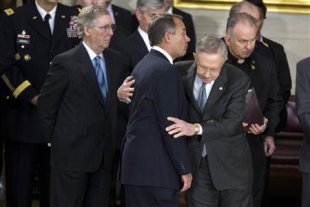ISLAMABAD (AP) — Pakistan released eight members of the Afghan Taliban from prison on Monday, including the former justice minister under the Taliban, in a bid to boost the peace process in neighboring Afghanistan, the government said.
Pakistan is seen as a lynchpin in efforts to bring about peace in Afghanistan as foreign troops plan to depart the country in 2014. Kabul has been pressing its neighbor to release more prisoners who they hope would bring the Taliban to the negotiating table before the U.S. troops go home.
The Pakistanis appear to have an interest in promoting peace across the border, as a resumption of the civil war there could bring harsh consequences on its side as well.
"We have released some more Taliban prisoners today as our help in the peace process in Afghanistan," Pakistan Foreign Office spokesman Moazzam Khan said.
In a statement, the Ministry of Foreign Affairs said eight detainees were released, including Nooruddin Turabi, the justice minister under the Taliban.
Mohammad Azeem, a former guard of Taliban leader Mullah Omar, was also among those released, according to a Taliban official. He spoke on the condition of anonymity because he was not authorized to speak to reporters about the sensitive subject.
It was not clear what role the eight released prisoners might play in bringing Taliban leaders to the negotiating table or what links they have to the group's current leadership.
Pakistan has longstanding ties to the Taliban and its support is key to any future reconciliation, just as its opposition would likely block any progress. For example, Pakistan could facilitate travel for Taliban leaders — many who are believed to reside in or travel to Pakistan frequently — to third countries for peace talks.
Last month, Pakistan released 18 prisoners at the request of the Afghan High Peace Council, the Pakistani Foreign Ministry said in its statement. In early December it promised to release more members of the group.
Both developments were seen as signs that Pakistan, long accused of backing militants, was supporting a new push to bring peace to a country with which it shares a long border and tumultuous history. The Afghan and U.S. governments accuse Islamabad of backing insurgents — an allegation Pakistan denies — and say many militant leaders are hiding in the country.
So far the militant group's former deputy leader, Mullah Abdul Ghani Baradar, has not been released, although Afghanistan has been pressuring Pakistan to set him free.
The Afghan peace process has made little headway since it began several years ago, hobbled by distrust among the major players, including the United States.
Part of the reason Pakistan is seen to be actively helping the process is that government and military officials are worried that if American troops leave without a plan in place, Afghanistan could deteriorate into another round of vicious infighting. After the Soviets pulled out in 1989, many of the militants who had helped best that superpower then turned on each other in what played out as a vicious war across the country.
A repeat of that scenario could have horrific consequences for Pakistan, such as a flood of Afghan refugees across its borders and increased fighting in Pakistan's tribal areas, where the military is already trying to suppress a stubborn insurgency.
Pakistani intelligence officials said Monday that they found the bodies of nine militants dumped in the North Waziristan tribal region.
The men were shot several times in the head and chest, said three Pakistani intelligence officials. Their bodies were found Monday off a road in Pir Kili village. The officials said the dead men were linked to the Pakistani Taliban, a militant group affiliated with the Taliban in Afghanistan but focused on fighting the Pakistani government.
The officials spoke on condition of anonymity because they are not authorized to speak to reporters.
North Waziristan is a hub of militant activity near the Afghan border.
The militants' bodies were found one day after 21 tribal police personnel who had been abducted were found dead in another tribal region.
___
Associated Press writers Kathy Gannon and Rebecca Santana in Islamabad and Rasool Dawar in Peshawar contributed.











